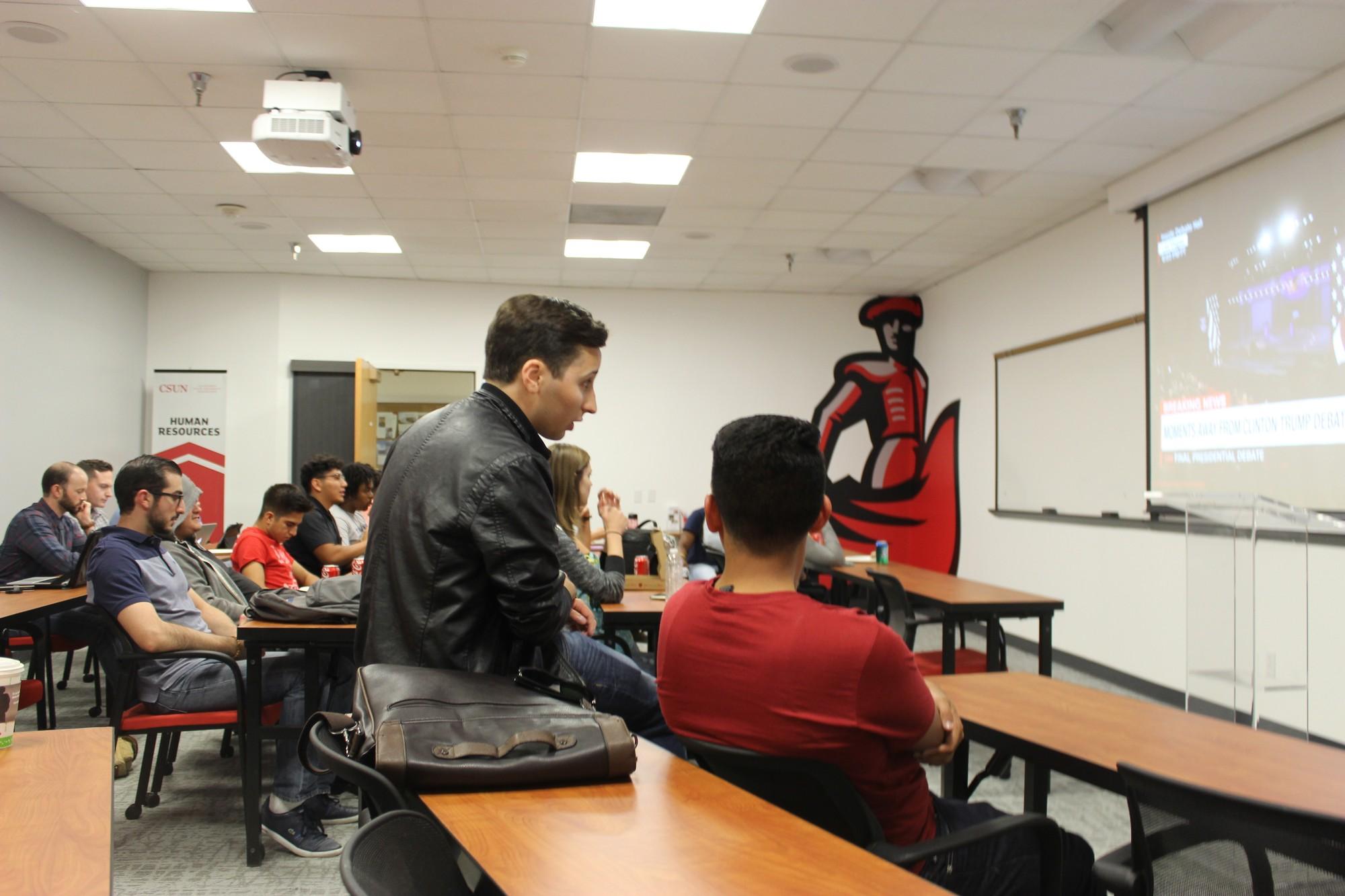Students watched as the presidential candidates pled to American voters in their third and final debate on Wednesday night.
CSUN’s Political Science Student Association (PSSA) gathered approximately 30 students and professors in Room 16 of the Oviatt Library to watch a CNN live stream of the debate between Republican candidate Donald Trump and Democratic nominee Hillary Clinton.
“It’s everything I would expect it to be,” said Victor Grau, a 21-year-old political science major. “They attacked each other like you would expect them to. It was as aggressive as you would expect it to be. They didn’t change my view. I knew exactly what they were standing for and they just clarified that.”
The third debate mirrored the previous two as both party’s presidential hopefuls spent time attacking each other over personal shortcomings and each other’s vision of America at the University of Nevada, Las Vegas.
“I look at debates differently than the way other people do,” said Sean Regan, 23, president of PSSA. “I came from the theatre world myself, so to me debates are primarily performance pieces. They’re theatre. The purpose of a debate isn’t really to discuss policy inasmuch as policy is a tool to bludgeon the opponent. The purpose of the debate is to win.”
The candidates sparred over issues that were not touched upon heavily or at all during their other debate opportunities.
Debate moderator and Fox News anchor Chris Wallace pressed Clinton and Trump on Supreme Court nominations and immigration.
“I feel that at this point in our country’s history, it is important that we not reverse marriage equality,” Clinton said. That we not reverse Roe v. Wade. That we stand up against Citizens United. We stand up for the rights of people in the workplace. That we stand up and basically say ‘the Supreme Court should represent all of us,’” Clinton said.
Trump offered an alternative to Clinton’s view of the court that falls more in line with conservative values.
“I feel that the justices that I am going to appoint, and I’ve named 20 of them, the justices that I’m going to appoint will be pro-life,” Trump said. “They will have a conservative bent. They will be protecting the Second Amendment. They are great scholars in all cases, and they’re people of tremendous respect. They will interpret the Constitution the way the founders wanted it interpreted. And I believe that’s very, very important.”
In regards to immigration, Trump touted his campaign’s cornerstone of building a wall and cracking down on drug trafficking by deporting drug traffickers.
Clinton voiced her opposition against a deportation force used to target undocumented immigrants, but also clarified she is not for open borders and claimed the need to deport “any violent person.”
The issue over the national debt was sidestepped by both candidates who both believe their economic solutions will grow the economy and not increase the debt.
Trump plans on creating jobs to counter a rising national debt under his economic plan, while Clinton suggested her increase in taxes on individuals making over $250,000 would offset any expansion to the debt.
But bickering from both sides and the debate’s more unusual moments, including Trump referring to some illegal immigrants as “bad hombres,” may have overshadowed any of the night’s substance.
Students joked about how it was Vladimir Putin who cut off the live stream of the debate when the library room’s internet connection faced brief technical difficulties, in reference to Clinton suggesting that Trump may hold loyalty to the Russian president earlier in the debate.
“You get occasional harassment and attacking, mean comments, and that’s what you really remember,” said Eden Rubin, a 21-year-old business marketing major. “They need to cut the bullshit, kind of, [and] say what they’re going to do instead of bashing each other.”
As for the candidates’ need to secure undecided voters, some students feel the debate did not further Clinton’s or Trump’s attempt.
“I think it’s a real slippery slope for the debates, but also for the election, to function this way that people rather watch them for entertainment than actual policy outcomes,” Grau said. “People don’t watch this debate to find out what to vote, people like entertainment. I just hope this won’t affect the debates in the next four years.”
Students also said that this debate only reaffirmed their positions for who they plan to vote for.
“I don’t think anybody gained or lost any voters, only being that if you were originally a Trump supporter you wouldn’t go ahead and change to Hillary’s side and if you were a Hillary supporter you wouldn’t change to Trump’s side,” Rubin said. “I think in general the election lost voters.”
Some students still prefer an alternative to what was offered on the debate stage.
“I still continue to believe that this is one of the most pivotal elections in our history, but my reasons for thinking that have dramatically shifted, having the hope and the idealism kicked out of me over the course of this election,” said Regan, who is a Republican, but plans on writing in a candidate for his vote. “I think people are scared. I think people have a lot of anxiety. We wanted people that would actually promote a positive agenda like outsiders. Instead we have Hillary Clinton and Donald Trump.”






